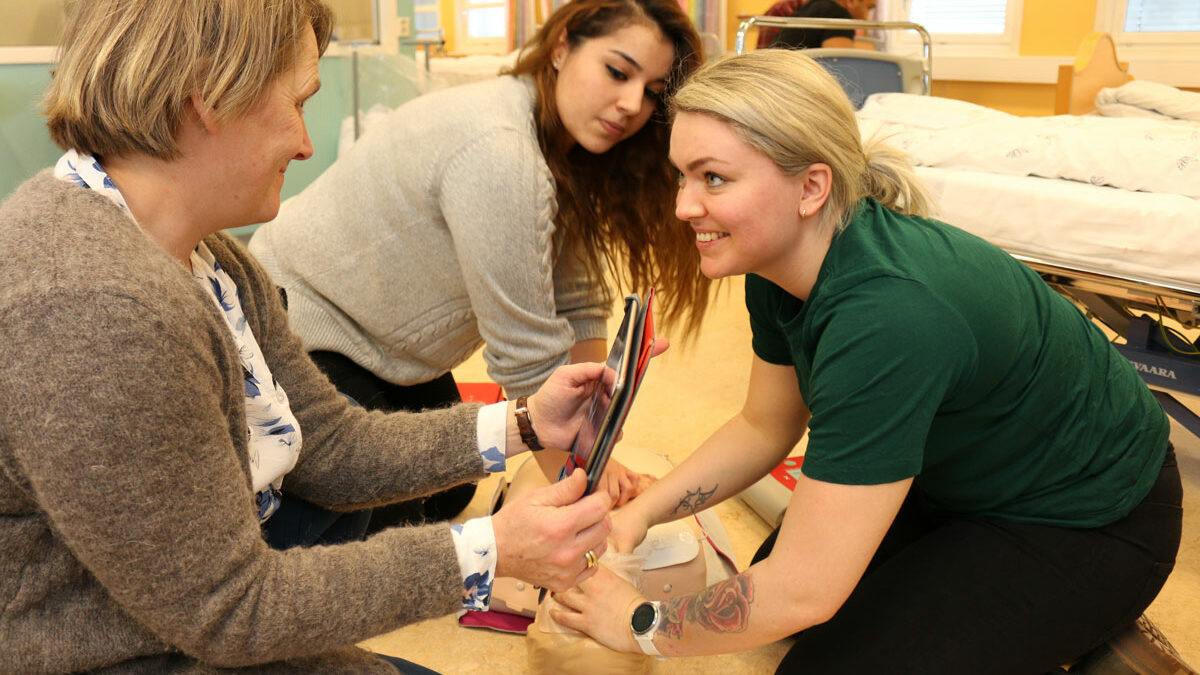En stor takk til dere som gjør studentene trygge!
I kommunene og på sykehusene jobber det sykepleiere, radiografer og ergoterapeuter som er trygge, tydelige fagpersoner. Tross den underlige tiden vi lever i, så klarer dere å gi studenter fra NTNU i Gjøvik viktig og god veiledning når de er i praksis. Dere er gode rollemodeller!
Til enhver tid blir over 400 helsefagstudenter fra NTNU i Gjøvik veiledet av erfarne sykepleiere, ergoterapeuter og radiografer når de er ute i praksisstudier. For å lære yrket og å skaffe seg erfaringer bruker studentene viktige uker hvert år på private og offentlige sykehus, røntgeninstitutt, i kommunale tjenester, på sykehjem, i hjemmetjenesten eller på rehabiliteringssentre.
For at en helsefagstudent skal bli rustet til å utøve yrket, er det nødvendig å ha erfaring fra møtet med brukere, pasienter og pårørende. Det holder ikke å lese om klinisk blikk og håndlag, det må øves. For sykepleiestudentenes del består faktisk halvparten av den treårige utdanningen av praksis. Det er mer enn i noen annen profesjonsutdanning.
NTNU i Gjøvik har et godt samarbeid om praksisplasser med alle kommunene i tidligere Oppland, flere kommuner i tidligere Hedmark, avdelinger ved Sykehuset Innlandet og ved private institusjoner i regionen. Vi er heldige som kan tilby studentene gode praksisplasser. De vet at de vil få god oppfølging og veiledning, og erfaringen gjør dem til ettertraktede arbeidstakere. Studenter med erfaring fra praksis blir handlekraftige når de skal ut i arbeid.
På praksisstedet møter studentene en kompetent veileder som følger, veileder og vurderer handlingene deres. Siden praksis står så sentralt i helsefagutdanningene, skal den kvalitetsikres på lik linje med resten av utdanningen. Ved å stille krav til kvalitet i utdanning og i praksis sikres også en velfungerende helsetjeneste.
Veilederne studentene har kontakt med ute i praksis er viktige rollemodeller. Tilfredshetsundersøkelser på helsefagutdanningene våre viser at studentene er svært fornøyde med læringsutbytte i praksisstudiene. Får studentene tett og god oppfølging, trives de; ja da vil de også komme tilbake. Gjennom samarbeidet mellom utdanning og praksis bidrar vi i fellesskap til å utdanne, forme og utvikle fremtidige profesjonsutøvere.
Mange studenter sier det var utfordrende å gå fra undervisning i klasserom til digitale forelesninger. Omstillingen har krevd mye av både dem og våre ansatte. Alle måtte i løpet av få dager i mars i fjor legge om rutiner. Møteplasser på campus ble borte, og en del studenter har slitt med ensomhet. Da har det vært ekstra viktig å ha praksisopphold der studentene kan møte ansatte, brukere og pårørende. At veilederne har tatt godt i mot våre studenter har vært av uvurderlig betydning både for studentene og ikke minst for morgendagens helsevesen.
Arbeidet med å opprettholde tilbudet om praksisstudier har skjedd ut fra en klar forventning fra Kunnskapsdepartementet om at dette skal gjennomføres for landets helse- og sosialfag studenter under pandemien, tross smittevernregler og strenge tiltak for å unngå oppblomstring av smitte.
Snart skal vi evaluere erfaringene fra pandemien og vårt utdanningsopplegg. Allerede nå vil jeg slå fast at uten trygge, dyktige praksisveiledere, så hadde NTNU alene ikke klart å opprettholde utdanningstilbudene i helsefag.
En stor takk til ledere og daglige veileder på hvert et praksissted som makter å opprettholde utdanningstilbudet i våre helsefag.

Siv Sønsteby Nordhagen
Praksiskoordinator og førstelektor
Institutt for helsevitenskap, NTNU i Gjøvik
-
This author does not have any more posts.




